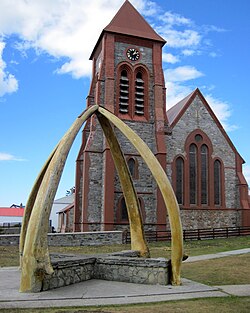Stanley Cathedral
| Stanley Cathedral | |
|
Christ Church Cathedral | |
|---|---|
|
Falkland Islands | |
| Status: | cathedral |
 Stanley Cathedral and its whalebone arch | |
| Location | |
| Location: | 51°41’32"S, 57°51’31"W |
| History | |
| Information | |
Christ Church Cathedral stands on on Ross Road in Stanley, the capital of the Falkland Islands. It is the southernmost Anglican cathedral in the world and, although there are other congregations, it is the only Anglican church in the Falkland Islands, and one of just three churches on the islands, all of which are in Stanley. It was consecrated as a cathedral in 1892.
The Cathedral is built on the site of Holy Trinity Church, which was destroyed by a peat slip in 1886.
In the front of this church stands a remarkable monument; a whalebone arch, made from the jaws of two blue whales. The monument was raised in 1933 to commemorate the centenary of the restoration of British rule in Falkland Islands.
An image of the church is featured on the reverse side of all Falkland Islands pound banknotes.
Status
The cathedral was consecrated in 1892 and originally served as the seat of a missionary diocese encompassing the islands and all of South America. In 1982 after the Falklands War, the Falkland Islands were separated from the Anglican Church of the Southern Cone of America to become an extra-provincial parish.
Today the cathedral serves as the parish church of the Parish of the Falkland Islands, encompassing the whole of the islands plus South Georgia and the British Antarctic Territory; part of the Anglican Communion but outside any province. The office of Bishop of the Falkland Islands has since 1978 been held ex officio by the Archbishop of Canterbury, who is both ordinary and metropolitan for the small autonomous diocese. In practice authority is exercised through a bishop-commissary appointed by the Archbishop of Canterbury, and known as the Bishop for the Falkland Islands. The minister of the cathedral is the Rector.

The church was designed by Sir Arthur Blomfield and built in 1890–1892 from the local stone and brick.[1]
Outside links
| ("Wikimedia Commons" has material about Stanley Cathedral) |